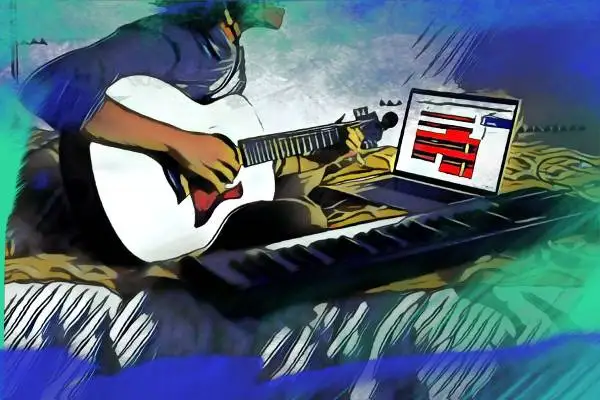If you're a guitarist who's in need of a way to record your licks efficiently, keep reading. Today we'll be covering the Best DAW for guitar recording. Whether you are in need of something that'll enable you to capture the smoothest performance or even something that allows you to build entire beats around your guitar work, a DAW may be the answer.
A digital audio workstation (DAW) is an application that serves the purpose of recording, editing, and mixing music, all from a centralized location. It makes the music creation process a bit easier, as it's pretty much like having an instant recording studio within reach.
Obviously, the style of guitar in which you play will determine the DAW that you gravitate towards. Maybe the stompbox plugins of a certain digital audio workstation will hook you. Or someone playing acoustic guitar might admire the compressors and audio processing fx needed to sculpt a great guitar tone.
Okay, so it's safe to assume you've got your guitar and audio interface. All that's missing is a DAW to piece it all together. Which is the best DAW for guitar? Let's dive in...
1. Logic Pro X
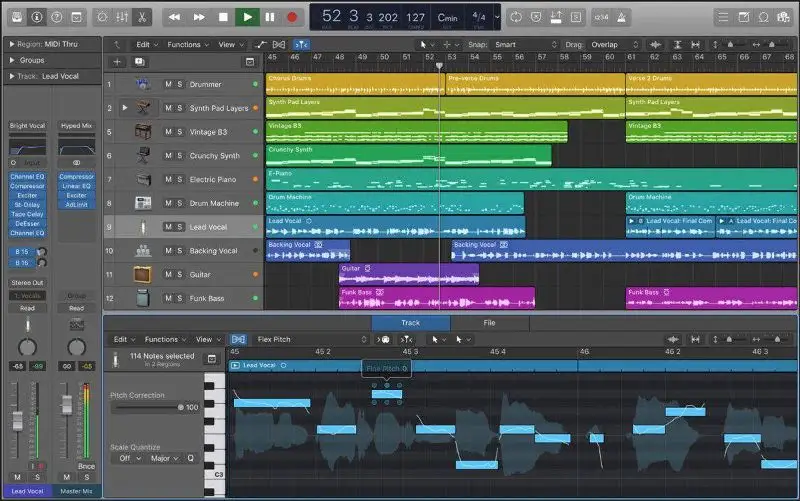
Logic Pro by Apple is an extremely popular DAW amongst producers, engineers, and artists alike, and with good reason. A clean user interface makes navigating the platform very straightforward.
It comes bundled with nearly all the tools you need to complete your track, from a huge sound library to excellent midi & audio editing and mixing features.
For guitar players, there's a host of amps, pedals, and stompbox plugins that you can chain together for interesting effects. Add to the fact that you're even able to drag and drop live loops into your session if you're in need of backing tracks for fresh inspiration.
Speaking of backing tracks, Logic Pro X has a cool drummer feature that serves as a personalized session drummer which can be tweaked and morphed to fit your track.
You have the option to switch between a variety of drummers themselves, as well as different genres to create a custom experience. It would seem to be a perfect way to practice your guitar licks or even finish out songs that need live drums in a sense.
Included in its host of onboard virtual instruments and fx, Logic Pro X has a few gems that stick out, especially for guitarists. These are the Amp Designer plugin, the Phat FX plugin, and its Pedalboard plugin which features over 35 stompboxes that can be mixed and matched together.
While there are many master guitarists out there who can record parts in one take, there are also those who record various takes, only to choose the best performances later. This is where Logic's comping feature comes into play.
Comping is made easy, as you're able to loop record which creates a take folder that allows you to simply select the best parts of your various takes. In just a few clicks, you're able to create a seamless performance.
Also worth mentioning is a companion app titled 'Logic Remote' which allows guitar recording, mixing, and editing from anywhere in your room via your iPad or iPhone. Crucial for those moments where you want to step away from the computer for a bit to get a different perspective.
One of the main downsides to Logic Pro would be that it's only available for Mac users, sorry Windows users. However, if you can lay your hands on it, Logic would prove to have everything you need to begin recording guitar.
More info here
Side note, if you own a Mac and you're reluctant to pay for Logic, you may like to try its predecessor 'Garageband'. Garageband is a great free DAW that offers beginner functionality, and a UI similar to Logic.
Obviously, it's not as loaded as its full version big brother, however, it's still a great app to have when playing guitar. It comes with a handful of amps to try out.
Pricing
- $199
- Trial version available
Reasons To Try
- 35 Stompboxes
- Amp Designer
- Upgrade Path From Garageband
- Nice audio comping feature
- Logic Remote
Reasons To Deny
- Mac OS only
2. Pro Tools
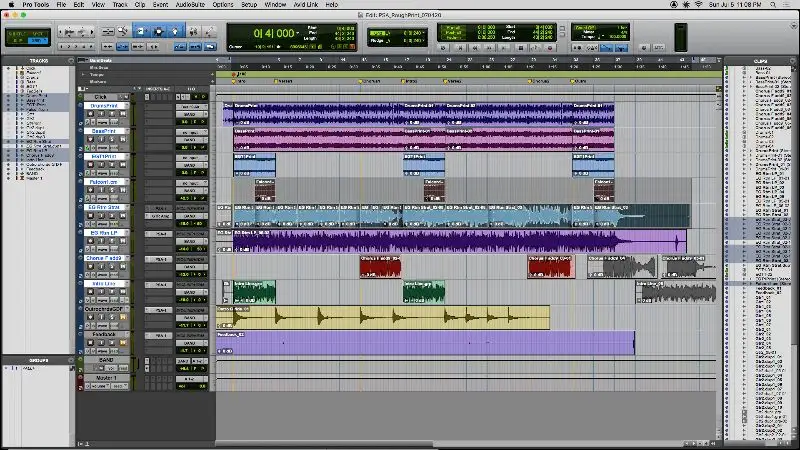
It's almost impossible to mention Logic Pro, without mentioning its industry-standard rival, Avid Pro Tools. Pro tools has been the leader in recording software for quite some time now, featured in professional studios worldwide.
When it comes to audio recording, Pro Tools does an excellent job at making the process clean and seamless. You're able to record in up to 32-bit floating/192 kHz audio resolution, allowing you to capture high-quality audio. The punch record feature works nicely as well.
Pro Tools is pretty much a blank canvas, perfect for guitar players who just want to plug up and begin recording.
Similar to Logic, Pro Tools has an excellent comping feature, which enables you to create the perfect take easily. Upon recording multiple takes, Pro Tools builds a playlist that you can select from, but it pushes it a step further by giving you the ability to rate each take on the fly.
Pro Tools Ultimate, the most extensive version comes with over 120 plugins to add to your music production tool belt. Included in this are around 14 stompbox effects as well as a host of other professional effects such as analog-modeled EQs, reverbs, and delays.
While Pro Tools is compatible with third-party plugins, it's not compatible with all plugin formats. Only plug-ins in its native AAX format will work. This can be a bit of a headache for guitarists/producers who have tons of VST plugins.
Another cool feature is their cloud collaboration, which enables you to work remotely with other musicians to finish up songs.
For those guitarists who don't have prior knowledge of studio workings or are coming from much simpler DAWs, Pro Tools can have a bit of a learning curve. There are many ins and outs of this DAW which can take a little while to get used to.
However, once learned, they can prove to speed up your workflow and help translate your vision faster and easier.
More info here
Pricing
- Artist Version - $9.99/Month
- Studio Version - $31.99/Month
- Ultimate Version - $99.99/Month
Reasons To Try
- Captures high-quality audio
- World-class recording environment
Reasons To Deny
- Prefer simpler DAW
- The ultimate version can be pricey
3. PreSonus Studio One
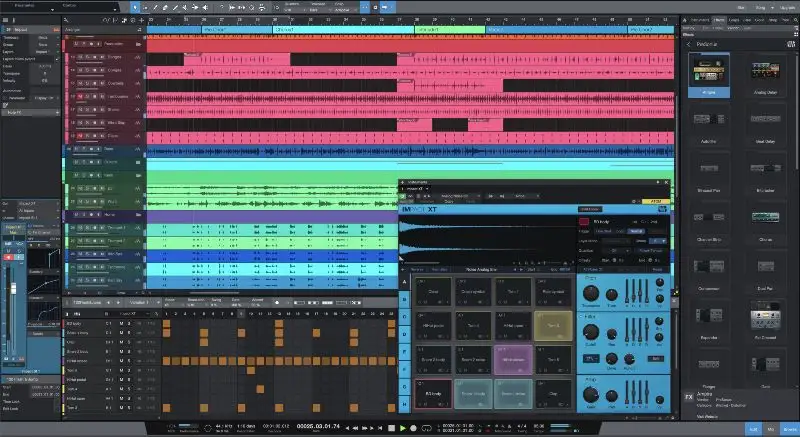
Studio One is perfect for modern audio production, enabling you to create music extremely fast. PreSonus is said to have pioneered the drag and drop format popular amongst modern DAWs and seeing that you can drag and drop virtually everything, it's no surprise the workflow feels quick.
Every version of Studio One supports unlimited tracks, giving you the freedom to create without worrying about running out of space per se.
Audio editing is a breeze as well, thanks to its smart tool, which kind of reminds me of Pro Tools a bit.
The drop-down menu when right-clicking on an audio clip enables you to do many cool things, such as convert audio to midi and vice versa, as well as change the gain envelope.
Guitarists will love Studio One's Ampire plugin, which is modeled after classic analog cabinets. The latest version of the software puts a focus on live performances, enabling you to switch Ampire presets fast on the fly, and even trigger them with MIDI controllers.
Also if you're a fan of live performances, you can take advantage of the Arranger Track which allows you to reorder, duplicate, and remove song sections.
You're able to experiment with different arrangements, swap sections, and/or structure a song exactly the way you see fit with a simple drag-and-drop format.
Studio One does a great job at making the UI very intuitive and inclusive, as you're able to access the Presonus shop from within the DAW, enabling you to download sample packs and plugins.
Speaking of plugins, it comes bundled with a myriad of toys to experiment with such as its 'Mix Engine FX' which is an analog signal processor, and its 'Chorder' plugin which acts as a chord trigger, simply by pressing single notes.
All in all, Studio One is a fantastic DAW that has much to offer the serious guitarist as well as the beginner.
Compatible with PC/Mac users
More Info here
Pricing
- Artist Version - $99
- Professional Version - $399
Reasons To Try
- Analog mix engine
- Ampire plugin
- Advanced audio editing
- 64 Bit Recording
- Built-in Mastering
Reasons To Deny
- Price maybe
- A few minor bugs
4. Ableton Live
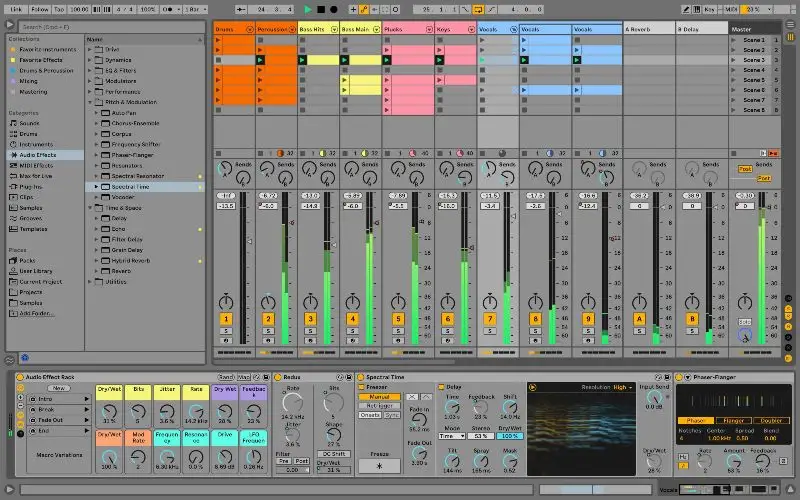
Ableton Live is the answer for those guitar players who also happen to be interested in electronic music production. Ableton is also one of the champions of live performance integration, hence the name 'Live'.
Ableton Live separates itself from other DAWs and the traditional workflow by making use of its Session view, which offers an interesting approach to creating music. It is undoubtedly one of the best daws for guitarists.
It's a non-linear workflow that functions by letting you record audio tracks or midi tracks and save them as clips vertically. These different clips can be mixed, matched, and triggered to create interesting combinations and sequences.
I imagine that a guitarist could have a bit of fun with this as it sort of relieves the pressure of completing a song when working linearly. You can record various guitar ideas, experiment, and later piece them together for cool results.
Ableton Live comes with many powerful audio and midi fx which add dimension to your productions. For live performances, Live has an allocated set of fx as well, such as its Looper and Beat Repeat.
The Suite version of Live comes bundled with over 70+ GB of sound library, 74 processing effects, and 17 instruments to spark creativity, and features a cool instant mapping function that allows nearly any parameter to be mapped to your midi keyboards.
I personally love to make use of the drum rack, as it's perfect for layering my sounds with additional samples and effects. But it's not just limited to drum samples per se, as you can drop any sample into the cells. It'd be interesting to see how a few layered guitar licks, ran through a few FX would sound.
Ableton Live is amongst the best DAWs for guitarists, especially those who love an experimental creative process. I'd say that it does come with a fair bit of a learning curve though, seeing that its Session view may take some time to get used to.
The included amps may not be as extensive as other DAWs, so it wouldn't be a bad idea to have a few good guitar amp VSTs on hand.
More info here
Pricing
- Intro Version -$99
- Standard Version - $449
- Suite - $749
Reasons To Try
- Creative approach
- Session View Workflow
- Extensive Midi Mapping
- Fast Creation
Reasons To Deny
- Learning curve
- Suite edition is pricey
5. Steinberg Cubase
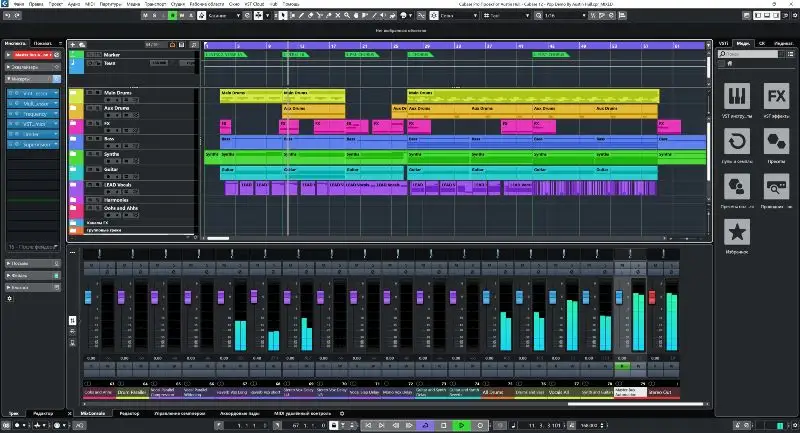
The original pioneer of virtual studio technology, Cubase has been around for quite some time now, and with excellent reason. It's one of the best DAWs for guitarists due to its professional recording/editing tools and work environment.
From the first glance, I noticed how well Cubase does with organization, enabling you to combine tracks into folders for a much neater workflow.
When it comes to recording, Cubase has a few cool features such as its Audio Pre-Record function which lets you record while the program is stopped.
Take advantage of this during those times when you've been playing but forgot to press record. You can set the number of seconds of incoming audio to be recorded in a buffer memory.
This segues into its retrospective midi record feature, which functions sort of in the same way, but for midi.
After your audio has been recorded, Cubase has a myriad of powerful audio editing tools to help further tighten your sound, some of these features being 'VariAudio' and 'Audio Alignment' for example.
VariAudio functions as a vocal editor/pitch change similar to Logic's Flex Pitch or Melodyne. You're able to fix timing issues and change the pitch of monophonic vocal recordings in real-time, without adding any artifacts. It even integrates with its Chord Track, allowing you to build chordal harmonies.
The Audio alignment tool would seem to be perfect for guitar recordings due to the fact that you're able to automatically match the timing of audio events, giving you tighter performances. You're even able to convert audio into midi if that's something that can aid your songwriting process.
Aside from hosting all of the processing effects typically found in other DAWs, Steinberg Cubase also has a cool Mix Console feature which is an analog styled mixer designed to give your tracks a bit of analog magic.
If you're a guitarist who also loves to capture that non-digital essence, I'm sure you'll love the user interface and sound of the Mix Console.
All the Cubase versions come with the same high-quality sound, however, the most basic version of the program doesn't feature all the instruments available in the more expensive editions.
The VST Amp Rack plugin is not available in the cheaper 'Cubase Le' version for example. But fret not as it appears in its 'Cubase Elements Version', which retails for $99.
Cubase is easily one of the best, if not the best DAW for guitar due to its powerful tools and is definitely worth giving a shot. A trial version is available for download.
More info here
Pricing
- Cubase Elements - $99.99
- Cubase Artists - $329.99
- Cubase Pro - $579.99
Reasons To Try
- VariAudio
- Audio Pre-Record
- Cool Stock Virtual instruments and Plugins
Reasons To Deny
- Cubase Pro is a bit pricey
- Need something a bit more user friendly, like Logic
6. FL Studio
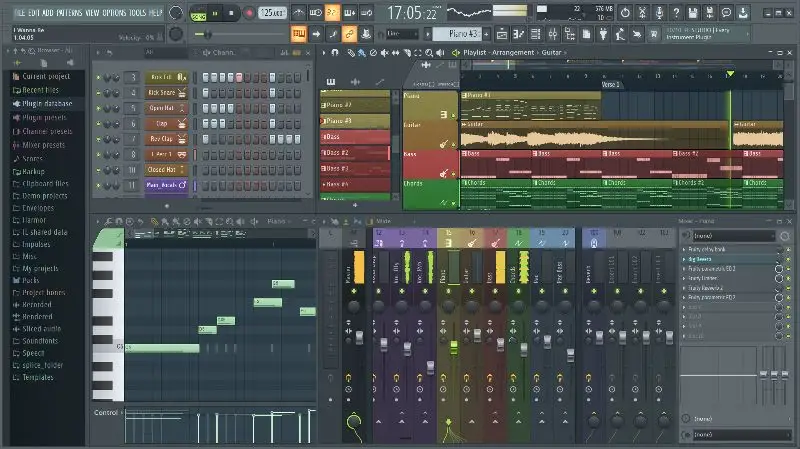
FL Studio, also known as Fruity Loops has been around for 20 years and is primarily used to produce electronic music. FL Studio is one of those digital audio workstations known for its super-fast drum programming capabilities, as you're able to sequence easily.
FL Studio was quite literally the very first DAW I've ever owned, and it helped me jump-start my music production journey via its simplicity.
Its click-style step sequencer has been used by bedroom producers everywhere, and in combination with the piano roll, you can build grooves quickly and edit midi notes in a variety of ways.
It does come bundled with nearly all the processing effects you'd see in other digital audio workstations, everything to fully mix your track.
A downside to FL Studio though would have to be the stock library sounds that come bundled with it. They just aren't as full and extensive as Ableton Live or Logic for example. Your best bet would be to import sound packs and make great use of some free VST plugins .
I remember using Reason around the time I started using FL years ago, and in hindsight, I kind of wish that the Reason rack plugin was around then. Combining FL's sequencing with Reason's sound library would have been epic then.
Also, another letdown is the fact that in the entry-level version of this daw, there isn't support for audio recording. So I can imagine that you'd be able to play and practice guitar licks, but wouldn't have the ability to record them unless you upgrade.
However, one aspect that sets FL Studio apart from its competitors is the fact that you get free lifetime updates, so from the moment you purchase FL, you're good for life.
Concluding, FL Studio is a powerful, great DAW for beginners and pros alike who are looking for a fast way to create music.
More info here
Pricing
- Fruity - $99
- Producer - $199
- Signature - $299
- All Plugins Edition - $499
Reasons To Try
- Step Sequencer
- Piano Roll
- Fast way to build drum patterns
- Great for electronic music
Reasons To Deny
- No audio recording in the entry-level edition
- Stock library pales in comparison to better DAWs
Conclusion
I hope you feel a tad more comfortable in deciding the best DAW for guitar-based music. The style of music you plan to compose with your guitar will obviously play a factor when making a choice as some DAWs will have certain tools catered to specific things. All DAWs certainly aren't created equal, so this is something to pay attention to.
Keep in mind that in addition to this list, there are completely free DAWs that are available as well. These offer almost all the features of the full counterparts, so take advantage of any free version that's out there to get your feet wet.
I completely understand how some of these professional DAWs can be rather pricey, especially if you just want to sample a bunch of them before fully committing. All in all, I'm sure that with so many options out there, you're bound to fall in love with one that has exactly what you need. It's really just a matter of experimentation.
With that being said, stay creative, stay productive, and stay inspired. Until next time!


